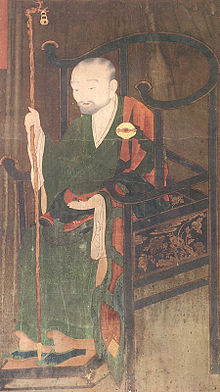Jinul
| Jinul | |
|---|---|
 |
|
| School | Seon |
| Personal | |
| Born | 1158 Goryeo |
| Died | 1210 |
| Senior posting | |
| Title | Zen Master |
| Successor | Hyesim (혜심/慧諶: 1178~1234) |
Bojo Jinul (Hangul: 보조지눌; Hanja: 普照知訥, 1158–1210), often called Jinul or Chinul for short, was a Korean monk of the Goryeo period, who is considered to be the most influential figure in the formation of Korean Seon (Zen) Buddhism. He is credited as the founder of the Jogye Order, by working to unify the disparate sects in Korean Buddhism into a cohesive organization.
Bojo Jinul's birthname was Jeong and by age 15 he left his family to ordain under Seon Master Jonghwi of Sagulsan Mountain School, one of the nine mountain schools of Seon, receiving the ordination name "Jinul". This occurred in 1173. By 1182, Jinul passed the royal examination for monks and qualified for a higher administrative position, but turned it down to join the Seon community in Pyongyang's Bojesa Temple. The community being uninterested in his efforts to reform the retreat community, he moved to Cheongwonsa Temple at Changpyeong, then Bomunsa Temple on Mt. Hagasan.
During this period of travel and study, Jinul was said to have studied the entire Tripiṭaka and had a series of awakenings. Jinul sought to establish a new movement within Korean Seon which he called the "samadhi and prajñā society" (Hangul: 정혜사; Hanja: 定慧社; RR: Jeonghyesa). This movement's goal was to establish a new community of disciplined, pure-minded practitioners deep in the mountains. Jinul eventually accomplished this mission with the founding of Songgwangsa at Jogye Mountain, and in the process the Jogye Order which taught a comprehensive approach to Buddhism including meditation, doctrine, chanting and lectures. By 1209, he completed his magnum opus the Excerpts from the Dharma Collection and Special Practice Record with Personal Notes (Hangul: 법집별항록절요병입사기; Hanja: 法集別行錄節要幷入私記; RR: beopjip pyeolhaeng nok cheolyo byeongip sagi), an extensive exploration of various schools of Chan Buddhism in China, with extensive commentaries on the writings of Chinese Buddhist monk Zongmi as well as personal notes.
...
Wikipedia
